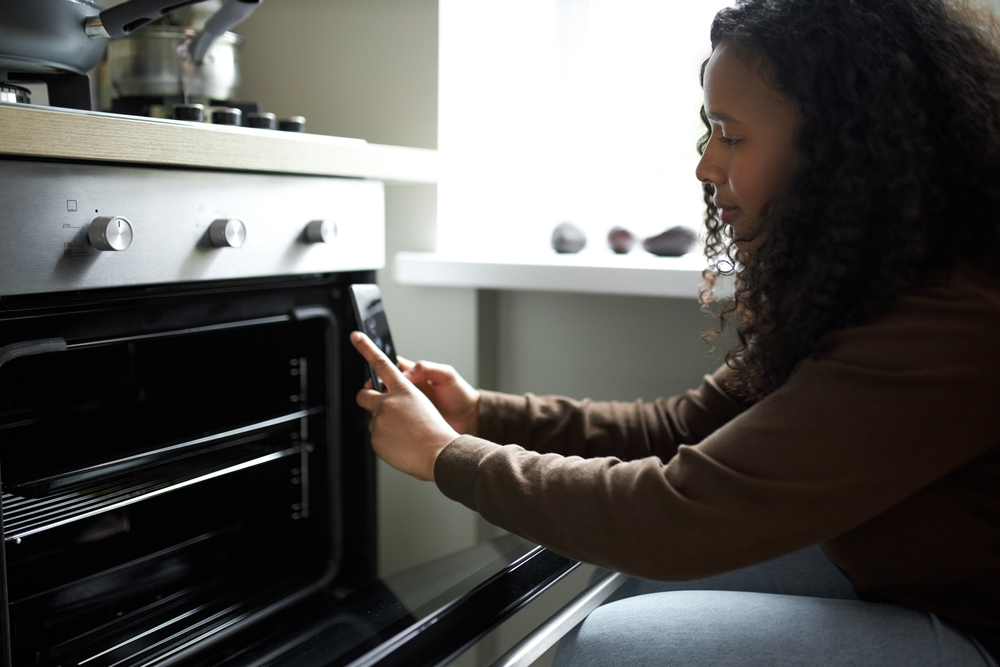Top 18 Must-Know Tips for Moving Out of State

Moving soon? Get organized with our free moving checklist.
Moving out of state can be challenging. You’ll feel like there’s not enough time to take care of things. But believe it or not, the whole process can be fun if you plan for everything in advance.
In this post, we’re sharing our top tips for moving out of state. If you follow these tips, we guarantee your journey will be much less complicated than it would normally be.
1. Figure out the logistics
One of the first things you should do after deciding to move out of state would be to figure out the logistics.
What do we mean by that?
You should first think about how you’re going to move. Will you be doing it yourself? If that is the case, can all your stuff fit in your car, or will you need to rent a moving van? Will you be asking friends or family to help you move? If you’re moving for work, will the company help with the moving process?
And what if you’re going to hire professional movers? How long will moving take you? Will you be taking out a moving insurance policy? How many trucks and movers will you need?
You can start your research when you figure out the answers to all these questions and more. Specifically, you’ll know how much money you’ll need to set aside for the big day.
You don’t need to have every detail finalized at this stage. But having some idea of how you’ll be moving out of state will make it easier to plan things.
2. Take inventory of your belongings
Taking inventory of your possessions accomplishes a couple of things. For starters, knowing how many items need to be moved will let you know what type of vehicle you’ll need.
But an inventory is also important because it makes you aware of items you can sell or donate to charity. It’s a good idea to get rid of things that you won’t need for the move, especially the bigger items such as furniture. You can even hold a garage sale to help pay for everything.
Having to move a ton of stuff across state lines is expensive enough as it is. You’ll save some money by only moving the essentials.
It’s worth noting that you can claim a tax deduction if you donate lightly used items to charity.
3. Research your new city
Laws and opportunities differ from state to state. That’s why you’d want to do thorough research before moving into your new home.
For example, any improvements you’d like to make to your house must be up to code. But that code could be different depending on where you move. Other laws could be different, too — some of them will directly impact your life. So you’ll need to familiarize yourself with local ordinances to avoid trouble.
Opportunities could be different too. For example, you could find that there aren’t as many job opportunities available for someone with your skill set. So make sure there are job opportunities where you’re relocating if you need to find one.
What else should you research?
You’ll want to know about schools in the area if you have kids. It will also help if you know where all the local shops are. Pet owners need to know the location of the closest vet clinics. If you have special dietary restrictions, you can research what dining options in the area can meet your needs.
4. Budget everything
Moving locally is already expensive. You could imagine how much it would take to move out of state. So you should start saving as soon as possible.
After researching and figuring out the logistics, you should already have enough information to estimate how much you’ll need.
But if money’s a little tight, there are ways you could save some money. For example, you could use recycled packing materials or schedule your move on a day with lower moving estimates.
Create a spreadsheet to keep track of all incoming expenses for reference. Make sure to leave a little extra for other expenses like tips for the movers.
5. Consider all your moving options
If you’re moving by yourself, you should start looking for a moving van that you could rent. If you’re not renting a moving van, you’ll need to figure out how you’re going to pack everything in your car.
If family or friends are helping you move, make sure you let them know in advance so they can add it to their calendars.
If you’re hiring a moving company, you should try booking them as early as possible. Ask for a quote to ensure you won’t exceed your budget. Also, consider the distance of the move as that will affect the pricing.
Get to know your moving company better to ensure you choose the right one. If you know people that have used it before, ask if there were any issues. You should also ask your moving company in writing if they will subcontract your move as doing so would mean your things would be divided between two or more trucks.
You can rent a storage facility if you want the opportunity to move pieces in stages. This way, you can offload essential items first and bring in your other stuff second.
6. Look for mover red flags
Interstate movers are heavily regulated by the US Department of Transportation’s Federal Motor Carrier Safety Administration or FMCSA. What does this mean? It means movers must provide a few things to stay in compliance:
- Motor vehicle insurance, liability insurance, and workers’ compensation should anything happen to their workers during your move.
- An up-to-date registration (renewed every two years).
- A US Department of Transportation number which is a unique ID that is assigned to moving companies to track things like their inspections and reviews.
That’s a lot of moving company terminologies, but familiarizing yourself with these terms will help you find reputable ones.
You only want to work with movers that comply with these requirements. Most companies will have this information on their websites. But if they don’t, you can always call them up and ask for it. Non-compliant companies should be avoided as they could potentially be scammers.
7. Manage expectations
It’s important to manage expectations when using a moving company. For example, did you know that a moving company will not arrive in your new home the same day you do? Instead, it will get there in days or weeks from when it picks up your possessions.
Moving companies refer to this as a delivery spread or the amount of time they promise to deliver all of your belongings. It’s standard practice for them to provide a delivery spread of 1 to 14 days.
Why is that? A moving company will use one truck to service multiple customers. This helps the company and you to save costs as moving things out of state can get outrageously expensive. So there’s no need to panic if your things don’t arrive when you do.
While you can gauge the delivery spread by setting your loading date, the ultimate length of the delivery spread is subject to other variables, including the move distance, time of year, and how much you need to ship.
It’s also important that you don’t overestimate your packing skills. While some can pack all their belongings in one night, that’s not the case for everyone. So make sure you give yourself enough time.
8. Deal with your utilities before the move
You don’t want to move into your new place only to find that the utilities aren’t up and running. While this is a tough ask for some people, those who can should transfer their utilities and home services early.
Make sure your water, sewer, garbage pickup, and internet access are ready before the big day. You want to feel at home the minute you arrive. If you come and one of your utilities is out, it’ll cause you a lot of unnecessary stress. Preparing just in case something goes wrong is also a good idea.
For example, you can bring food that doesn’t require refrigeration in case the power is out. You can also borrow a portable power station (or buy one if you have the budget) so you could at least power a fan for a couple of hours. Power banks might also be a good idea since they’ll let you charge your phone and other small gadgets.
9. Think about shipping your car
You’ll have to think about shipping your car; especially if you’re moving across the country and have no plans of driving there. Deciding on a schedule and your car shipping budget are the two most important steps, so you will want to do those first.
Be aware that transporting a car can take between one to two weeks. That means you won’t have any means of getting around your new city unless you rent a car, rely on a car-hailing app, or take public transport.
You might want to consider talking with your new neighbors about carpooling. If you found employment before moving, ask if they can provide transportation options. They might even lend the company car if they have one available.
10. Research your travel options
Are you driving your car? Are you renting a van? Are you taking the train? Are you rising a bus? Are you flying to your destination?
You’ll need to think about how you’re getting to your new home as early as possible. You’ll find that ticket prices change the closer you are to your target departure date. So making reservations ahead of time will help you save some money.
And if you’re driving, you’ll have to factor in the cost of food and accommodations. This is especially true if you’re traveling with family. If your family has dietary restrictions, you’ll need to carefully choose which restaurants along the way will be able to cater to your needs.
If you’re dependent on medication, you should be aware of the local pharmacies you’ll be driving through on your way to your new home. You never know when you might have to make a quick stopover for refills.
11. Update your license and registration
You should update your license and registration as soon as you’re able to. Every state is a bit different regarding when one should change their license and registration information. But it’s usually between 10 and 30 days.
Go ahead and check the requirements and book an appointment in advance if that is possible.
You’ll also need an updated license if you’re going to become a member of local organizations. You’ll even need it to register to vote (more on that later).
12. Pack ahead of time
Most of the stress with moving boils down to packing all your stuff. But if you get it out of the way as soon as possible, you’ll find that the whole process becomes more manageable.
Packing your belongings a week or more ahead of schedule will lessen the stress of moving. You can start boxing items that you don’t use as frequently and slowly pack away more and more items as the days go by.
Make sure that all your items are securely packed for the ride. You can use straws and egg cartons to pack your jewelry. It’s also a good idea to take photos of your electronics—especially the cable wiring—so that you’ll have no issues reconnecting all of them once you’re in your new home.
13. Have a go-bag
Having a go-bag in your car or on your person will make sure that you don’t have to open bags or boxes while you’re on the move. It can be a hassle to open sealed boxes to find any item you could have had within arm’s reach.
Your go-bag should also include important documents that you’ll need for the trip. These can include tax and insurance papers as well as forms of identification. Other items too sensitive to leave in the moving truck should also come with you.

14. Exchange contact information with your moving company
Make sure you can leave your contact information with the moving company before you part ways. You want them to be able to get in touch with you should anything go wrong. Also, double-check that they have the correct address.
You can also leave a second or third number they could call if they fail to contact you. Some might want to consider leaving a social media profile they can message as a last resort.
Giving them a map—even a link to one—will help make sure that they don’t end up in a location that happens to have the same street name, which does happen.
15. Save your receipts
You will want to save all of your receipts for future reference. These receipts can keep you on track so that you don’t go over your budget. And if your new employer is helping you pay for the move, they’ll need to see these receipts.
Unfortunately, you can no longer write off moving expenses as part of your tax return.
16. Let friends and family know that you’re moving
You should set aside time to let friends and family know you’re moving. At the very least, create a private group and let them know where you’re moving and when.
This will give you enough time to set up a get-together or talk over the phone. This might also be a good idea to ask for help with the move if you’re close enough to these people.
You can also say goodbye to members of organizations you’re a part of. For example, if you’re a member of your local gym, you might want to let people there know that they won’t be seeing you in a while. Don’t forget to add people you want to keep in touch with on social media.
17. Update your online information
Log into your different online shopping accounts and subscriptions to change your mailing address. For instance, you’ll want to enter your new address before making your next Amazon purchase so the product gets delivered to the right location.
The same goes for your other billers like your mobile carrier and banks. Make sure that those friends and family who need to know your new address have copies of it.
18. Register to Vote
You should figure out how voter registration works in your new state so you can register to vote before the next elections. You will need an updated ID to register, such as a driver’s license.
Simplify moving out of state
Moving out of state shouldn’t be a chore. On the contrary, it’s a cause for excitement because you get an opportunity to start fresh elsewhere. By following these tips, you should have an easier time relocating to your new home.













